AFL 2024: Mark Robinson on how coaching and player feedback has changed over the years
Today’s coaches’ box is a computer convention, writes Mark Robinson. Long gone are the days of personal abuse and player tears. Here’s how, what and who changed over the years.
There was something nostalgic when it was said St Kilda coach Ross Lyon gave a spray to his players at halftime of the Richmond game last Sunday.
“I didn’t, not true,’’ Lyon said this week. “At quarter-time I gave them a little one. Not at halftime.
“We had some roles … take care of Shai Bolton going forward, kick-ins they will do this and we let them out, we blazed away, we didn’t go near Dusty (Martin).
“At quarter-time I was like, ‘I asked you to do your bloody job, just do your bloody job’. That’s the Bill Belichick of the Patriots, just do you bloody job.’’
Two days earlier, Port Adelaide coach Ken Hinkley was captured by TV cameras having a word with Zak Butters on the bench. Butters had made an error, Essendon kicked a goal, and Butters ran to the bench.
Hinkley wasn’t smiling. Nor was Butters looking at his coach. We’re guessing that Hinkley wasn’t too complimentary with his feedback. Asked after the game about the interaction, Hinkley said: “I’m always talking to Zak. I probably was, I can’t remember it now. But I’m sure we were talking.’’ He half smirked when he answered.
Butters certainly wasn’t dragged to get an earful. Those days are long gone. One club official stressed this week that a rotation can’t be wasted in that regard.
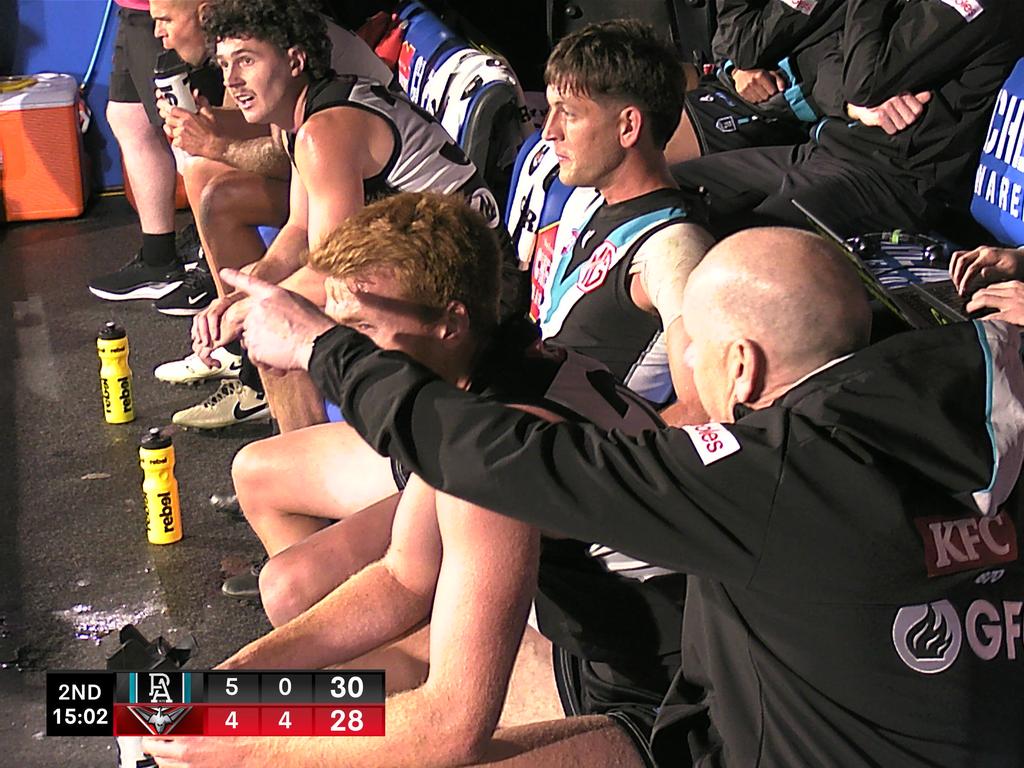
So much has changed in football in terms of coaching and feedback.
In the mid-1990s, the coaching cohort included David Parkin, Robert Walls, Denis Pagan, Kevin Sheedy, Mick Malthouse, Rodney Eade, Terry Wallace, Stan Alves and Malcolm Blight. Their methods were regularly confronting to say the least.
Parkin’s neck vein, which grew in status as frustration grew in Parkin, should be in an AFL museum. As should his chewing gum. And Eade’s Will Minson barrage. And Wallace’s “I’ll spew up’’ speech. And Sheedy’s post-preliminary final lashing in ’96. And Blight’s David Pittman attack. The stories are many and there are countless untold.
In those days, personal abuse towards players was common and expected. Players would be left in tears and, in some circumstances, told to harden up. Any type of “softness’’ was seen as a weakness. Indeed, coaching boxes back then were, at times, an afternoon of character assassination.
Today’s coaches’ box is a computer convention. Players remain in the gun, but it’s mostly about system, process, structure and numbers.
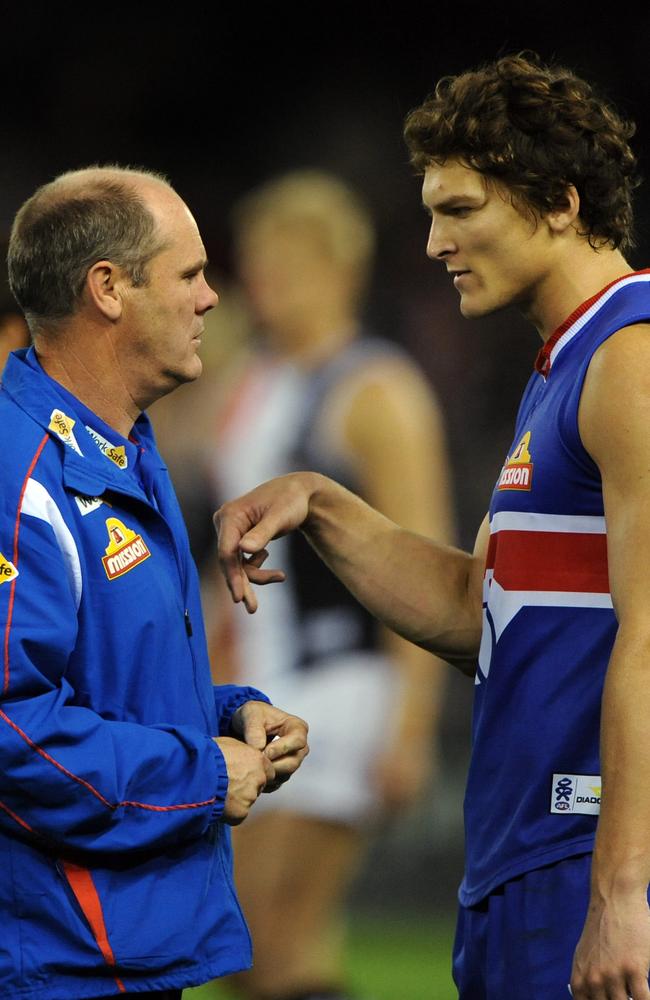
Moving with the times
Lyon played under Walls and Parkin at Fitzroy. “Wallsy was hard,’’ Lyon said, “and Parko was harder in some ways. They flogged us.”
The world is different. The players are professional and are prepared to the minute by high-performance managers. Most coaching is done in the pre-season – about how they want the team to play – and then during the week in preparation for the game. The coaching group consists of line coaches, psychologists, welfare people, medicos and wellbeing specialists.
Lyon remembers, as a young player, driving himself to a physio in Preston for several weeks to have an injured groin looked at it. “You had to row your own canoe,’’ he said.
Back then, the players trained twice a week and, Lyon said, the coaches hardly spoke to the players. “Wallsy used to teach footy, he was a good tactician,’’ he said. “Parko taught you about effort and application … he was ruthless.’’

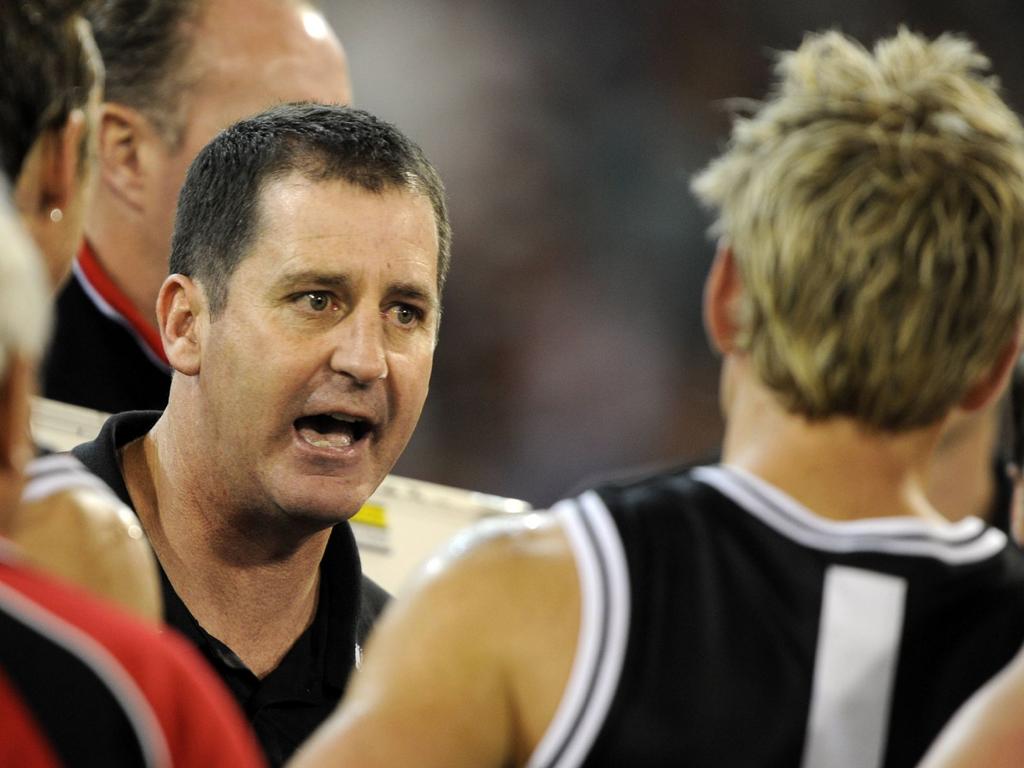
Lyon the coach has moved with the times. His first St Kilda group from 2007-11 played with an edge and Lyon was seen to be the ruthless, arrogant ring leader, which in reality was never the truth. He admits this time round he’s less “sharp’’ with his players, and a million miles from the Walls, Parkin, Pagan and Sheedy approach.
“The principles are the same, it’s still an accountable environment but done in a softer way,’’ he said. “I’m probably not as sharp. It’s the same model of possibility, action, alignment, system, effort … but it’s really feedback.
“I’ve said it before, we’re safe to fail but create excellence in learning. That’s the hard bit, to take the feedback and learn.’’
He says he doesn’t pin press articles on lockers to motivate players, which once was commonplace, and occasionally will reference what an opposition coach says about his team. “If a coach was disrespectful, I’d say, ‘How do you feel about that?’’’
Outside of his Belichick editorial at quarter-time last week, he is mostly whimsical and cuddly Ross. As are all of today’s coaches.
Chris Scott hasn’t waved his arms in frustration in three years, Brad Scott is Mr Cool when his team is Mr Calamitous, Craig McRae is Mr Positive, Hinkley is Mr Lovable, John Longmire largely controls himself when clearly he is raging within and even Adam Simpson is docile when he could be driven to being an imbecile.
New-age football, compared to the 1990s, and with all the post-match hugging, is a love-fest.
‘If you trip over your f---ing bottom lip again’
It was 2005 or 2006, and I was lucky to sit in the St Kilda coaching box when Grant Thomas led the team.
At a point in the game, Thomas picked up the phone and bellowed to the runner: “Get Rooey off the ground.”
“Rooey’’ was Nick Riewoldt, the club’s emerging superstar. The runner made a beeline for Riewoldt. Clearly deflated, Riewoldt ran to the bench, head down and shoulders rolling, and on arrival put the phone to his ear.
The memory of the exact message is long forgotten, but what wasn’t forgotten was Thomas’ parting words. “And if you trip over your f---ing bottom lip again, you’re straight off.’’
It was a wow moment because the coach had clipped the champ.
Thomas this week allowed that story to be told. “You pick and choose,’’ Thomas said. “There’s incidents where I’ve gone hard at a player and eyeballed him.
“But I also remember another bit of vision of me whispering in Aaron Fiora’s ear at one of the breaks. He was the sort of guy who couldn’t handle being called out. He clearly wasn’t hard enough on a couple of occasions and instead of telling him in front of the whole playing group, I whispered in his ear.
“It’s picking and choosing what’s best for the individuals.
“While Rooey loved encouragement, now and again he also needed to be squared up like every other player.’’
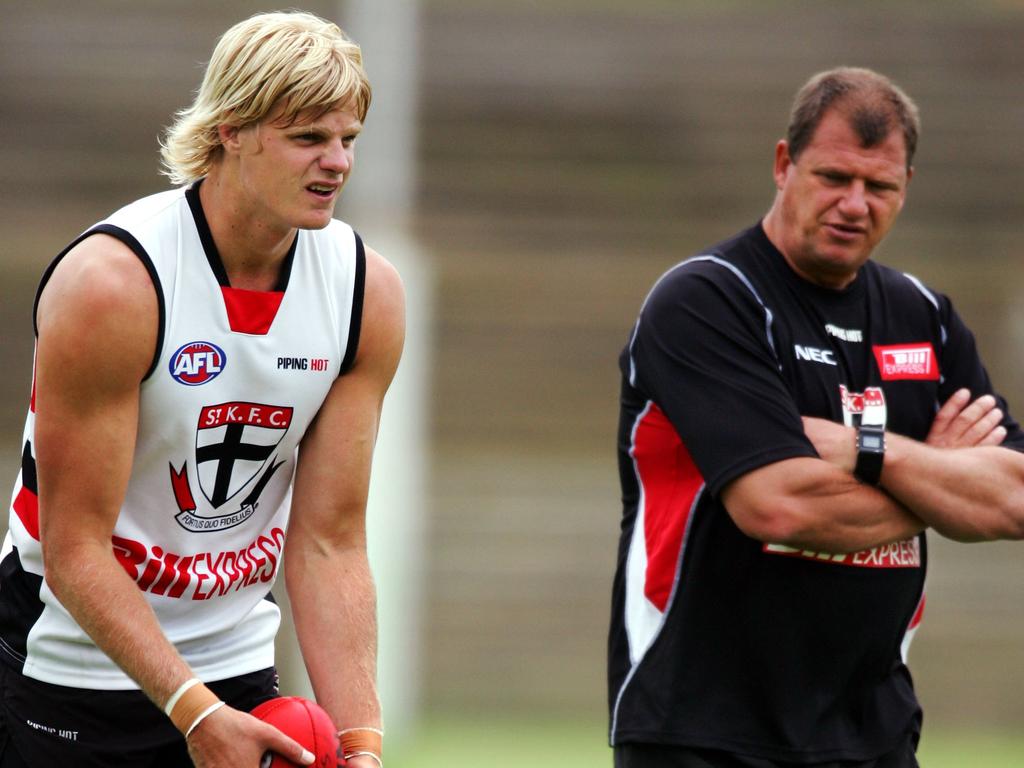
Thomas played for St Kilda from 1978-83, and then for a year at North Melbourne and another year at Fitzroy. He also coached the Saints from 2001-06 before he was sacked for Lyon.
In some ways, Thomas and the likes of Sydney’s Paul Roos, Geelong’s Mark Thompson, Adelaide’s Neil Craig and West Coast’s John Worsfold, were transitional coaches. The fire and brimstone of Parkin, Pagan, Sheedy et al, was replaced by more detailed coaching and personal interaction.
“I would like to think that I was distinct from those legendary coaches you mentioned,’’ he said. “I had more of a paternal approach/EPL manager.’’
Those legends were also instructive and motivational, but arguably also coached with fear and intimidation.
“I was heavily focused on the development of individuals and acceleration of maturity,’’ Thomas said. “If I could help players to understand who they were and have a greater respect and understanding of the privileges they had … it’s about self-development.
“It was definitely that esteem thing rather than the regimented, soldier-like philosophy.’’
Coaches today, we are led to believe, have given away the “rah rah’’ pre-match motivational-type speech. The last coach to do that publicly was Beau McCreery’s mum, Julie. God knows what the legends thought of that performance.
Thomas hated them. “I used to get shitty when players used to say stuff like, ‘We owe this team’. I’d say, ‘Understand that revenge is the weakest form of motivation’. In my mind, and having been a St Kilda player as well, where the hell do we stop having revenge? We got our arses kicked from pillar to post by every team in the competition.’’
He believes the tactics and strategies of today’s footy, intertwined with the less confrontational nature of how young people want to be spoken to, meant coaches had to change.
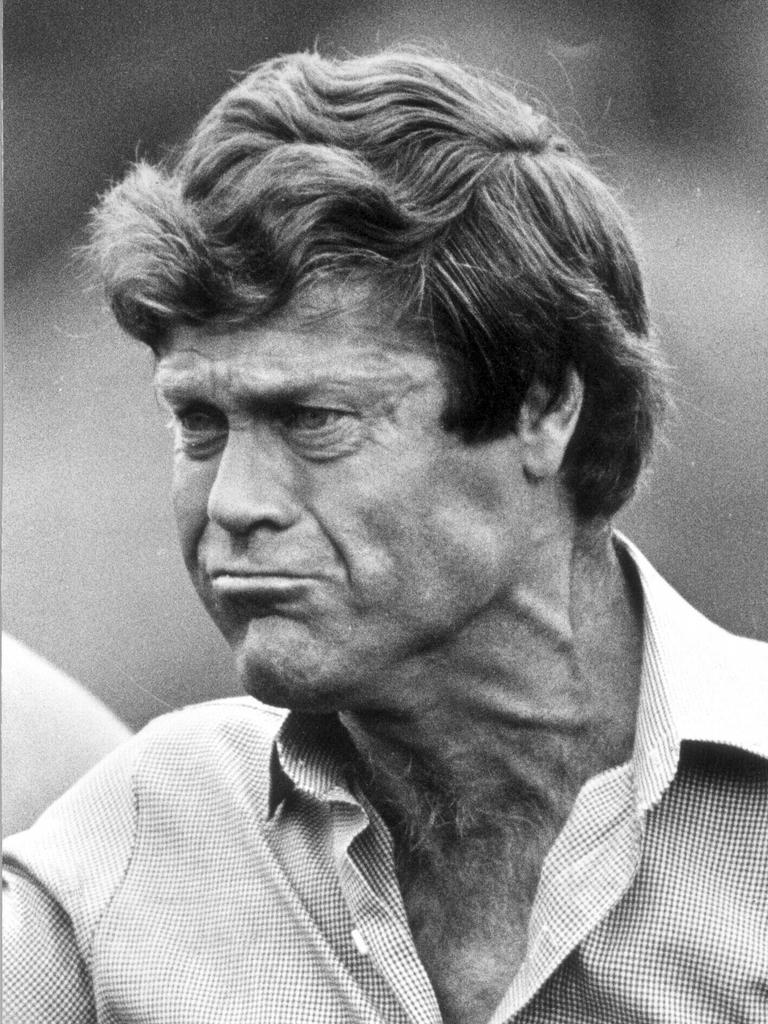
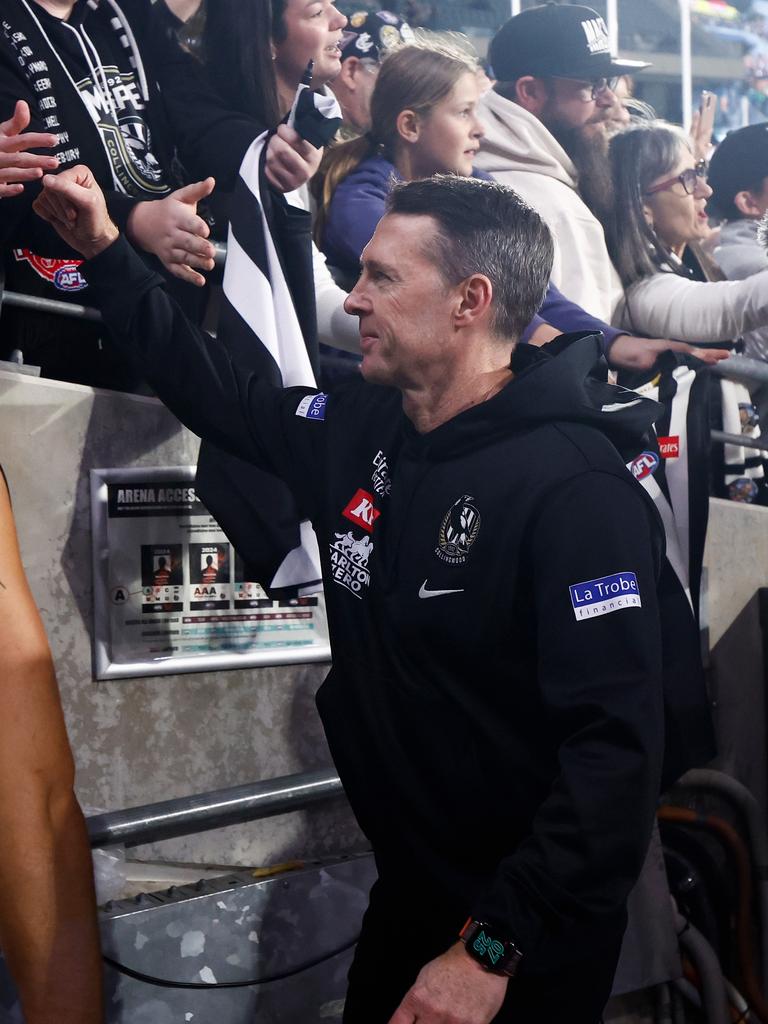
Today’s footy, he said, remained the same. That coaches needed to find the right balance between attitude and effort, and strategy and tactics. “The coaches who have got it wrong are the coaches who think it’s more about strategy and tactics and they don’t manage the standards of the attitude and effort well enough,” Thomas said. “That’s why you get wild fluctuations in team performance.’’
Thomas admires Craig McRae. “McRae got it right last year and he will get it right again because I think he’s a superstar,’’ he said. “He has a fantastic balance between attitude and effort and tactics and strategy.’’
Still, football itself was more clinical, Thomas said.
“It’s less emotional and more strategic,’’ he said. “Basically, these are the guidelines of which we play under, these are the plans, strategies and tactics and you will adhere to those.
“There will be some counselling around parts of the game, like, ‘Listen, there were a few contests if you had your time again you should’ve done differently, and it’s important you go back and get those things right and build up your confidence,’ … that sort of stuff.
“Rather than someone like Dermott Brereton who would like to be told. ‘Dermott, you’ve set a standard for your attitude and effort, you didn’t go anywhere near hard enough in that contest, it cost us a goal and it also cost you your brand. So, the next contest you need to win your brand back’.
“Dermott would have steam coming out of his ears and froth coming out of his gob, and would attack the next contest with a level of venom. He would respond accordingly.
“Today, other players/coaches wouldn’t deal with that. They’d wait until Monday, look at the tape, or speak more generically. Back in the day, it was a different story.
“Coaches these days maybe are a little afraid to confront those types of things.
“This generation for whatever reason, and we can only blame ourselves because we brought them up, aren’t as confrontationally savvy as the previous generation, as the previous generation, as the previous generation.’’
Thomas also played under Walls, but has different memories of his coaching. “He was easily the most controlled, tactical and strategic and supportive coach I had,’’ Thomas said.
‘If I had my time again …’
In March this year, Walls spoke of his battle with acute lymphoblastic leukaemia, which prompted a lifetime of reflection.
He was a superb player for Carlton and Fitzroy and admits coaching changed his character. He knows this because his wife, Erin, who passed away in 2006, told him.
“I can remember Erin saying to me many times, ‘Gee, you’re rude to people’. This would be at the footy,” Walls said. “We’d be going into the game, or coming out of the game, and all I’m thinking about is the team, what’s going to happen, what am I going to say, and when you’ve lost, you’re pissed off, you’re angry, and people would be wanting to talk to you.
“And Erin would say, ‘Gee, you’re rude to people’. I said, ‘I don’t mean to be, but I’ve got my mind on other things’.
“If I had my time over again I’d be a lot friendlier. I never forget when I got the sack at Carlton, I had a year out and then I went to Brisbane, and Serge Silvagni said to me, ‘For God’s sake, let people know you have got a sense of humour, you’re just too stern, too abrupt, too blunt,’ and I think I did start to do that when I went to Brisbane.’’

Coaching Carlton brought out a dictatorial nature in Walls.
“Coaching Carlton was never much fun,’’ he said. “The expectation was huge. When I coached at Fitzroy, there was Arthur Wilson and George Coates who was chairman of selectors, and they let me do what I wanted.
“When I went to Carlton, I met John Elliot at the Jam Factory. I’d never met Elliott before. There’s Elliott, Wes Lofts and Ian Collins all at the Jam Factory, and they said to me, ‘Don’t you worry about anything, we run the club, you coach, and we’ll do everything else’. Collo also said to me, ‘You make your own decisions, but make sure three out of four were right’.
“At Fitzroy, which was a poor, rundown, batting place, I was No.1 in the pecking order, and I knew when I was Carlton, I was about No.4 or No.5 on the list.’’
So, it’s all about the environment.
In terms of coaching, what happened then is a far cry from what happens now. But should it be so vastly different?
There’s a documentary on Netflix called Together, which is about Manchester City’s 2022-23 season. Manager Pep Guardiola is the centrepiece.
A tactical and motivational genius, Guardiola also “squares up’’ to multimillion-dollar players. You wonder how he’d fare in the AFL?
More Coverage
Originally published as AFL 2024: Mark Robinson on how coaching and player feedback has changed over the years





